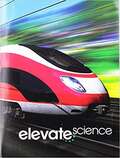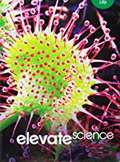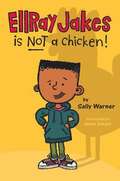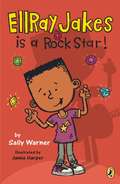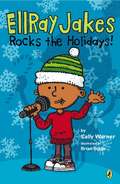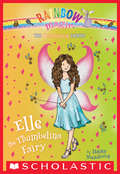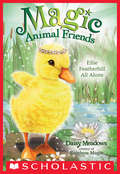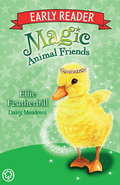- Table View
- List View
Elevate Science, Grade 8
by Michael J. Padilla Zipporah Miller Michael E. WysessionNIMAC-sourced textbook
Elevate Science, Grade K
by Michael J. Padilla Patricia Shehan Campbell Zipporah Miller Michael E. WysessionNIMAC-sourced textbook
Elevate Science, Segment 1: Grade 4
by Michael J. Padilla Zipporah Miller Michael E. WysessionNIMAC-sourced textbook <p>Grade 4</p>
Elevate Science, Segment 2: Grade 4
by Michael J. Padilla Zipporah Miller Michael E. WysessionNIMAC-sourced textbook <p>Grade 4</p>
Elevate Science, Segment 3: Grade 4
by Michael J. Padilla Zipporah Miller Michael E. WysessionNIMAC-sourced textbook <p>Grade 4</p>
Elevate Science, Segment 4: Grade 4
by Michael J. Padilla Zipporah Miller Michael E. WysessionNIMAC-sourced textbook <p>Grade 4</p>
Elevate Science: Earth
by Michael J. Padilla Zipporah Miller Michael E. WysessionNIMAC-sourced textbook
Elevate Science: Earth, Florida
by Michael J. Padilla Zipporah Miller Michael E. WysessionNIMAC-sourced textbook
Elevate Science: Grade 4
by PearsonElevate Science is a comprehensive K-5 science program that focuses on active, student-centered learning. Elevate Science builds students' critical thinking, questioning, and collaboration skills. It fuels interest in STEM and creative problem solving while supporting literacy development for elementary-age learners.
Elevate Science: Grade 4, New York
by Michael J. Padilla Zipporah Miller Michael E. WysessionNIMAC-sourced textbook
Elevate Science: Life
by Michael J. Padilla Zipporah Miller Michael E. WysessionNIMAC-sourced textbook
Elevate Science: Physical
by Michael J. Padilla Zipporah Miller Michael E. WysessionNIMAC-sourced textbook
Elevate Science: Segment 1
by Michael J. Padilla Zipporah Miller Michael E. WysessionNIMAC-sourced textbook <p>Grade 1
Elevate Science: Segment 2
by Michael J. Padilla Zipporah Miller Michael E. WysessionNIMAC-sourced textbook <p>Grade 1
Elevate Science: Segment 4
by Michael J. Padilla Zipporah Miller Michael E. WysessionNIMAC-sourced textbook <p>Grade 1
EllRay Jakes Is Not a Chicken
by Jamie Harper Sally WarnerEllRay Jakes is tired of being bullied by fellow classmate Jared Matthews. But when EllRay tries to defend himself, he winds up in trouble. Then his dad offers him a deal: If he stays out of trouble for one week, they'll go to Disneyland! EllRay says he can do it. But saying it and doing it are two very different things.
EllRay Jakes Is a Rock Star
by Jamie Harper Sally WarnerAll the boys in EllRay's third-grade class have something they can brag about. Corey's on the swim team, Kevin is super tall, Jared's dad has an ATV. But EllRay's dad is a geologist - not much to brag about. After all, rocks are boring. Then EllRay sees the crystals in his dad's office, and they are really cool looking. If EllRay just "borrows" them to show his classmates, he knows they'd be impressed. And his dad will never have to know. It's a perfect plan . . . until things go awry.
EllRay Jakes Rocks the Holidays!
by Brian Biggs Sally WarnerIt's December at Oak Glen Primary School and all EllRay can think about is Christmas. As far as he's concerned, Christmas is the best--no school, presents, fun parties, and lots of cookies! But before EllRay can celebrate with his family, he must lead half the school in the Winter Wonderland assembly. How tough can it be to memorize a few lines? Very tough, especially when EllRay's soon-to-be ex-friend gives him a challenge to perform onstage. If he completes the challenge, he'll save his friendship...but he'll also ruin the assembly. EllRay is in for a not-so holly jolly time.
Ella's School Trip: Independent Reading Blue 4 (Reading Champion #458)
by Jackie WalterElla is nervous about her first school trip - to a museum. Where will she sit? Where will she have lunch? There are so many things she feels worried about ... but maybe with the help of her friend, Josh, she will enjoy the trip after all. Reading Champion offers independent reading books for children to practise and reinforce their developing reading skills.Fantastic, original stories are accompanied by engaging artwork and a reading activity. Each book has been carefully graded so that it can be matched to a child's reading ability, encouraging reading for pleasure.This story is part of Reading Champion, a series carefully linked to book bands to encourage independent reading skills, developed with Dr Sue Bodman and Glen Franklin of UCL Institute of Education (IOE)
Ella's Walk (Fountas & Pinnell Classroom, Guided Reading Grade 1)
by Tammie Lyon Diane AllenNIMAC-sourced textbook
Elle the Thumbelina Fairy: A Rainbow Magic Book (Storybook Fairies #1)
by Daisy MeadowsOnce upon a time in Fairyland. . . . Jack Frost is up to his old tricks again. He has sent his goblins to steal the Storybook Fairies' magic objects -- and now readers' favorite stories are all mixed up. Best friends Rachel and Kirsty must work quickly to find Elle's magic ring.
Ellie Featherbill All Alone: 3: Ellie Featherbill All Alone (Magic Animal Friends #3)
by Daisy MeadowsFrom the mind of Daisy Meadows comes a new fantasy world, with the same great magical voice as Rainbow Magic but brand-new adventures!Best friends Jess and Lily visit Friendship Forest, where animals can talk and magic exists!The girls are visiting Friendship Forest for Ellie Featherbill's birthday! When Grizelda's wicked plan to poison the river puts the little duckling in danger, can Lily and Jess save the day?
Ellie Featherbill: Book 3 (Magic Animal Friends Early Reader #3)
by Daisy MeadowsWelcome to a magical world where animals talk and play - just like you and me!Best friends Jess and Lily love all animals. But when they follow a mysterious golden cat into Friendship Forest - a place where animals live in tiny cottages and sip dandelion tea at the Toadstool Cafe - their animal friends suddenly become much more magical!On their first adventure in Friendship Forest, can the two friends rescue adorable baby bunny Lucy Longwhiskers from the wicked witch Grizelda?

